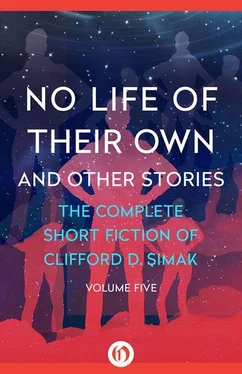“No, sir,” said Jenkins. “Your father never mentioned it and I felt, somehow, that he wouldn’t wish me to.”
“Thank you, Jenkins,” said Webster.
Webster huddled back into his chair again, felt desolate and alone and misplaced. Alone in a humming lobby that pulsed with life—a loneliness that tore at him, that left him limp and weak.
Homesickness. Downright, shameful homesickness, he told himself. Something that boys are supposed to feel when they first leave home, when they first go out to meet the world.
There was a fancy word for it—agoraphobia, the morbid dread of being in the midst of open spaces—from the Greek root for the fear—literally, of the market place.
If he crossed the room to the television booth, he could put in a call, talk with his mother or one of the robots—or better yet, just sit and look at the place until Jenkins came for him.
He started to rise, then sank back in the chair again. It was no dice. Just talking to someone or looking in on the place wasn’t being there. He couldn’t smell the pines in the wintry air, or hear familiar snow crunch on the walk beneath his feet or reach out a hand and touch one of the massive oaks that grew along the path. He couldn’t feel the heat of the fire or sense the sure, deft touch of belonging, of being one with a tract of ground and the things upon it.
And yet—perhaps it would help. Not much, maybe, but some. He started to rise from the chair again and froze. The few short steps to the booth held terror, a terrible, overwhelming terror. If he crossed them, he would have to run. Run to escape the watching eyes, the unfamiliar sounds, the agonizing nearness of strange faces.
Abruptly he sat down.
A woman’s shrill voice cut across the lobby and he shrank away from it. He felt terrible. He felt like hell. He wished Jenkins would hurry up.
The first breath of spring came through the window, filled the study with the promise of melting snows, of coming leaves and flowers, of north-bound wedges of waterfowl streaming through the blue, of trout that lurked in pools waiting for the fly.
Webster lifted his eyes from the sheaf of papers on his desk, sniffed the breeze, felt the cool whisper of it on his cheek. His hand reached out for the brandy glass and found it empty, put it back.
He bent back above the papers once again, picked up a pencil and crossed out a word.
Critically, he read the final paragraphs:
The fact that of the two hundred fifty men who were invited to visit me, presumably on missions of more than ordinary importance, only three were able to come, does not necessarily prove that all but those three are victims of agoraphobia. Some may have had legitimate reasons for being unable to accept my invitation. But it does indicate a growing unwillingness of men living under the mode of Earth existence set up following the break up of the cities to move from familiar places, a deepening instinct to stay among the scenes and possessions which in their mind have become associated with contentment and graciousness of life.
What the result of such a trend will be, no one can clearly indicate since it applies to only a small portion of Earth’s population. Among the larger families economic pressure forces some of the sons to seek their fortunes either in other parts of the Earth or on one of the other planets. Many others deliberately seek adventure and opportunity in space while still others become associated with professions or trades which make a sedentary existence impossible.
He flipped the page over, went on to the last one.
It was a good paper, he knew, but it could not be published, not just yet. Perhaps after he had died. No one, so far as he could determine, had ever so much as realized the trend, had taken as matter of course the fact that men seldom left their homes. Why, after all, should they leave their homes?
Certain dangers may be recognized in—
The televisor muttered at his elbow and he reached out to flip the toggle.
The room faded and he was face to face with a man who sat behind a desk, almost as if he sat on the opposite side of Webster’s desk. A gray-haired man with sad eyes behind heavy lenses, eyes that were filled with the sadness and humility of having looked on death and misery, compassionate eyes.
For a moment Webster stared, memory tugging at him.
“Could it be—” he asked and the man smiled gravely.
“I have changed,” he said. “So have you. My name is Clayborne. Remember? The Martian medical commission—”
“Clayborne! I’d often thought of you. You stayed on Mars.”
Clayborne nodded. “I’ve read your book, doctor. It is a real contribution. I’ve often thought one should be written, wanted to myself but I didn’t have the time. Just as well I didn’t. You did a better job. Especially on the brain.”
“The Martian brain,” Webster told him, “always intrigued me. Certain peculiarities. I’m afraid I spent more of those five years taking notes on it than I should have. There was other work to do.”
“A good thing you did,” said Clayborne. “That’s why I’m calling you now. I have a patient—a brain operation. Only you can handle it.”
Webster gasped, his hands trembling. “You’ll bring him here?”
Clayborne shook his head. “He cannot be moved. You know him, I believe. Juwain, the philosopher.”
“Juwain!” said Webster. “He’s one of my best friends. We talked together just a couple of days ago.”
“The attack was sudden,” said Clayborne. “He’s been asking for you.”
Webster was silent and cold—cold with a chill that crept upon him from some unguessed place. Cold that sent perspiration out upon his forehead, that knotted his fists.
“If you start immediately,” said Clayborne, “you can be here on time. I’ve already arranged with the World Committee to have a ship at your disposal instantly. The utmost speed is necessary.”
“But,” said Webster, “but … I cannot come.”
“You can’t come!”
“It’s impossible,” said Webster. “I doubt in any case that I am needed. Surely, you yourself—”
“I can’t,” said Clayborne. “No one can but you. No one else has the knowledge. You hold Juwain’s life in your hands. If you come, he lives. If you don’t, he dies.”
“I can’t go into space,” said Webster.
“Anyone can go into space,” snapped Clayborne. “It’s not like it used to be. Conditioning of any sort desired is available.”
“But you don’t understand,” pleaded Webster. “You—”
“No, I don’t,” said Clayborne. “Frankly, I don’t. That anyone should refuse to save the life of his friend—”
The two men stared at one another for a long moment, neither speaking.
“I shall tell the committee to send the ship straight to your home,” said Clayborne finally. “I hope by that time you will see your way clear to come.”
Clayborne faded and the wall came into view again—the wall and books, the fireplace and the paintings, the well-loved furniture, the promise of spring that came through the window.
Webster sat frozen in his chair, staring at the wall in front of him.
Juwain, the furry, wrinkled face, the sibilant whisper, the friendliness and understanding that was his. Juwain, grasping the stuff that dreams are made of and shaping them into logic, into rules of life and conduct. Juwain using philosophy as a tool, as a science, as a stepping stone to better living.
Webster dropped his face into his hands and fought the agony that welled up within him.
Clayborne had not understood. One could not expect him to understand since there was no way for him to know. And even knowing, would he understand? Even he, Webster, would not have understood it in someone else until he had discovered it in himself—the terrible fear of leaving his own fire, his own land, his own possessions, the little symbolisms that he had erected. And yet, not he, himself, alone, but those other Websters as well. Starting with the first John J. Men and women who had set up a cult of life, a tradition of behavior.
Читать дальше












